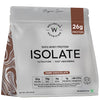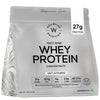After an intense workout, your body goes through various stages of recovery, from repairing muscle tissues to replenishing lost nutrients. One supplement that has garnered significant attention for its role in post-exercise recovery is whey protein. In this blog, we will delve into how whey protein can enhance your recovery process and address several critical aspects of its benefits.
Understanding Whey Protein
Whey protein is a high-quality protein derived from milk. It is rich in essential amino acids, making it a favorite among athletes and fitness enthusiasts. Unlike other protein sources, whey protein has a fast absorption rate, allowing it to quickly supply amino acids to the muscles after a workout. This rapid absorption is vital for effective recovery, making it one of the best protein supplements available for muscle recovery [NIH].
Role of Whey Protein for Muscle Recovery
The importance of whey protein for muscle recovery cannot be overstated. When you engage in strenuous exercise, particularly strength training, your muscles experience microscopic tears. This damage is part of the muscle-building process but requires adequate nutrition to repair effectively.
Whey protein helps facilitate muscle repair by providing the essential building blocks your body needs. Research indicates that consuming whey protein post-workout can significantly enhance muscle recovery compared to other protein sources. This is largely due to its high levels of leucine, an amino acid that plays a critical role in stimulating muscle protein synthesis [NIH].
So, how exactly does whey protein help recovery?
-
Amino Acid Profile: Whey protein boasts a complete amino acid profile, containing all nine essential amino acids that the body cannot produce on its own. This is crucial for effective muscle repair and growth.
-
Fast Digestion: The whey protein absorption rate is significantly higher than that of other protein sources. This means that amino acids are made available to your muscles almost immediately after consumption, further supporting quick recovery.
-
Insulin Response: Whey protein stimulates insulin production, which plays a role in the uptake of amino acids into the muscles. This action helps expedite the recovery process.
Benefits of Whey Protein After Exercise
Integrating whey protein into your post-exercise routine can yield numerous benefits:
Accelerated Muscle Recovery
The amino acids from whey protein are quickly absorbed, aiding in the rapid repair of muscle tissues. This leads to reduced recovery times, allowing you to train harder and more frequently.
Reduced Muscle Soreness
One of the common experiences after a workout is muscle soreness, also known as delayed onset muscle soreness (DOMS). Whey protein and muscle soreness have been linked in studies, showing that whey protein supplementation can help reduce the severity and duration of muscle soreness, enabling you to resume training sooner.
Enhanced Strength Gains
For those focused on whey protein for strength training recovery, this protein can support the development of lean muscle mass. The quicker recovery and enhanced muscle protein synthesis contribute to improved strength over time.
Improved Overall Recovery
Beyond muscle repair, whey protein provides your body with essential nutrients that can enhance overall recovery, including supporting your immune system and replenishing energy stores.
Beyond Muscle Recovery
Enhanced Absorption with Digestive Enzymes
Many modern whey protein supplements are fortified with digestive enzymes like lactase and proteases. Lactase assists in breaking down lactose, making it easier to digest for those sensitive to dairy products. Proteases enhance the breakdown of protein into smaller peptides, improving absorption and minimizing digestive discomfort. This combination ensures that users can enjoy the benefits of whey protein while maximizing its bioavailability. As a result, your body can efficiently utilize the amino acids necessary for various physiological functions, from muscle repair to immune support.
Probiotic Benefits: Supporting Gut Health
In recent years, some whey protein formulations have begun to incorporate probiotics, beneficial bacteria that promote gut health. A healthy gut microbiome plays a crucial role in overall wellness, influencing everything from digestion and nutrient absorption to immune function and mental health. By combining whey protein with probiotics, users can support not only their protein intake but also enhance their digestive health. This synergy can lead to improved digestion, reduced bloating, and better overall gut function, making whey protein a powerful tool for maintaining a healthy digestive system.
Immune System Support
Whey protein is not just for athletes; its benefits extend to immune system support. It is rich in immunoglobulins and lactoferrin, compounds that can bolster the immune response. The amino acids present in whey, particularly cysteine, are precursors to glutathione, a potent antioxidant that helps protect cells from oxidative stress. By supporting immune function, whey protein can play a vital role in overall health and well-being, particularly during periods of increased physical stress or illness.
Conclusion: Elevate Your Recovery with Whey Protein
In summary, whey protein is an essential component of post-workout recovery. It not only facilitates muscle recovery by providing a complete amino acid profile and rapid absorption rate, but it also reduces muscle soreness, enhances strength gains, and supports overall wellness.
With added benefits like improved digestibility and immune support, whey protein empowers you to train harder and recover faster. By incorporating one of the best protein supplements – whey protein into your post-exercise routine, you can optimize your performance and set yourself up for long-term success.



























